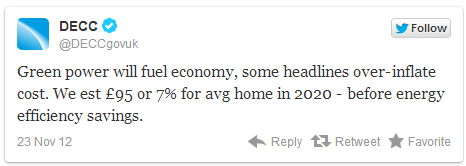 The Telegraph, one of the quality newspapers in the UK, has lost some of it’s credibility by their reporting on the latest Energy Bill. The headline “Wind farms to increase energy bills by £178 a year” is in our opinion a bit misleading..
The Telegraph, one of the quality newspapers in the UK, has lost some of it’s credibility by their reporting on the latest Energy Bill. The headline “Wind farms to increase energy bills by £178 a year” is in our opinion a bit misleading..
Since this will only happen over a period of TWO DECADES – and this only represents an increase of 0.6% per year based on a bill of 1300 pounds. Furthermore, the article concludes with a clear promotion of their “switch” button (see below) that pushes readers towards their energy comparison service. A bit of perspective would have been nice, since the good news is that by 2020 as much as 30% of the UK’s electricity would be generated by renewable energy. We look forward to see the entire energy bill when it will be due early next week.

According to the Guardian, Energy and climate change secretary, Ed Davey, was on the Today programme this morning. Ed Davey called headlines of huge increases, “utter rubbish”:
The impact from supporting green policy is only 2% on people’s bills at the moment. That will grow and by 2020 it will be about 7%. We are talking about under £100 in 2020.
And Decc‘s been tweeting about headlines that over-inflate cost, presumably in a nod to the Telegraph’s headline:

And the Renewable Energy Agency also mentions that the headlines are “wildly over-stated” on the impact of the bills increase:
Headlines grossly misrepresent cost to consumers of renewable energy. We are concerned that the implications of this decision for household bills are being wildly over-stated in parts of the media. Analysis by REA based on Ofgem/DECC data shows support schemes for renewables have contributed around £4 to energy bill price increases. That equates to 2% of total bill increases over the past two years.